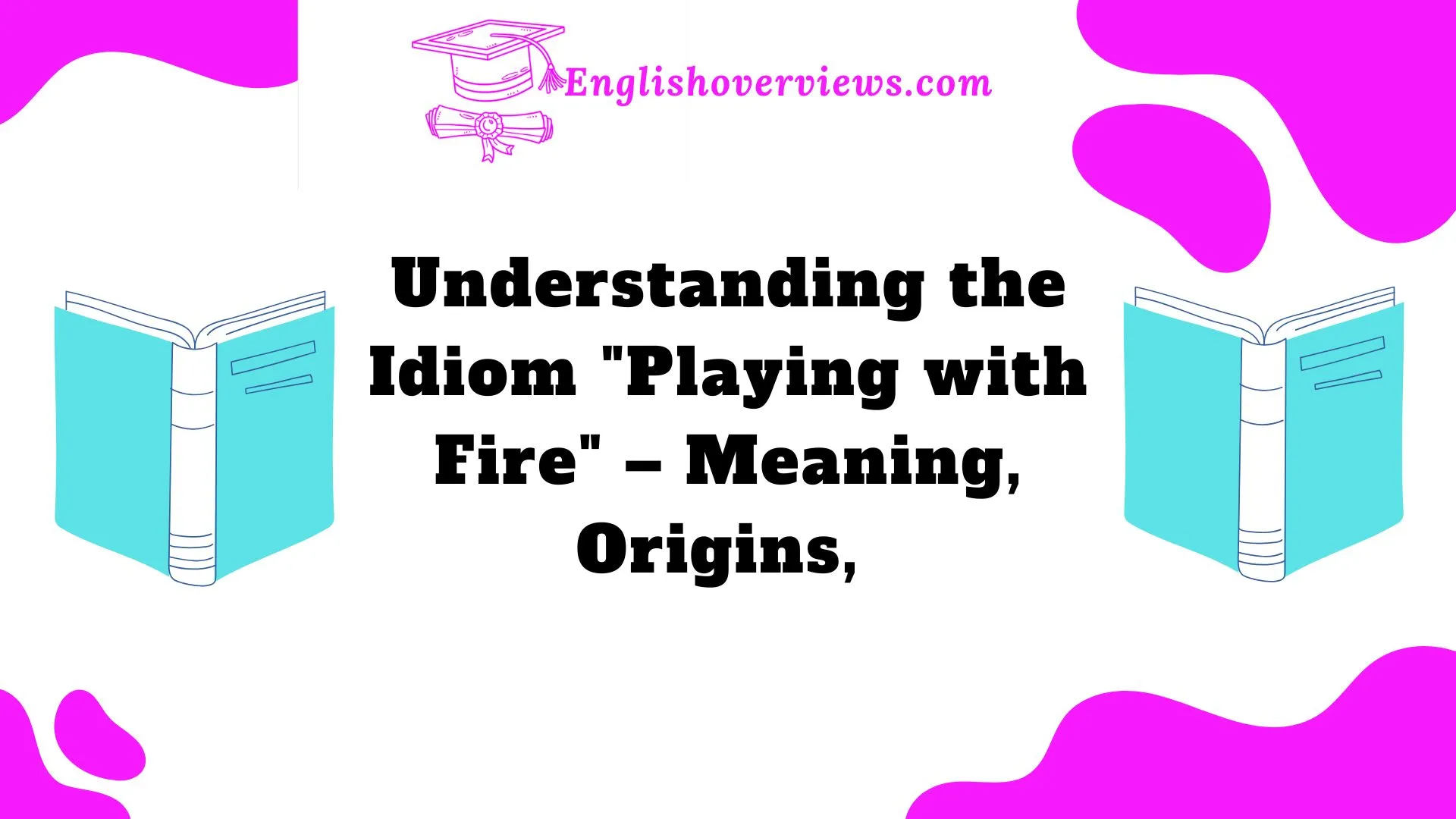“Playing with fire” is a phrase that pops up often in conversations, books, movies, and even in our everyday lives. It’s a metaphor that people use to describe risky or dangerous behavior. But, have you ever stopped to think about what it really means, where it comes from, or why we use it so much?
Well, this article dives deep into the meaning of “playing with fire,” its origins, its impact on our lives, and much more.
By the end, you’ll not only understand the idiom better, but you’ll also discover why people are drawn to risky behavior, the lessons we can learn from it, and how it crosses cultural lines. So, tune in as we unpack the layers of this intriguing idiom!
What Does the Idiom “Playing with Fire” Mean?
At its core, “playing with fire” refers to engaging in behavior that is risky or potentially harmful, with the awareness that it could lead to dangerous outcomes. It’s like testing the limits, knowing full well that the consequences could be severe.
Literal Meaning
The literal meaning of “playing with fire” is straightforward—it’s what happens when you physically play with fire. Imagine a child or someone who decides to handle fire without taking proper precautions. It’s clearly dangerous because fire can burn, destroy, and cause harm.
Figurative Meaning
However, the idiom is most often used figuratively. It applies to any situation where someone is involved in reckless behavior or makes decisions that have the potential for serious consequences. For example:
- Taking a risk in a relationship (like flirting with someone who’s already in a committed relationship).
- Investing money in high-risk stocks without doing proper research.
- Cheating on a test or a partner, knowing there could be fallout.
Essentially, you’re aware that your actions are risky, but you’re still willing to engage in them hence, “playing with fire.”
The Consequences of Risky Behaviors (The Dangers of Playing with Fire)
When you “play with fire,” the consequences are often far-reaching and unpredictable. The real danger lies in underestimating the possible outcomes. Let’s break it down:
Emotional and Psychological Risks
Engaging in risky behaviors often comes with emotional and psychological consequences. For instance:
- Heartbreak can result from a flirtation that goes too far.
- Financial ruin might follow after an impulsive investment that doesn’t pay off.
- Guilt and anxiety often accompany actions that feel wrong but are taken anyway.
The psychological weight of taking these risks can linger long after the event itself. It’s important to remember that the emotional fallout can sometimes be worse than the physical consequences.
Real-World Examples
Consider the case of Bernie Madoff, the infamous financier behind the largest Ponzi scheme in history. His desire to keep up appearances and risk everything for financial gain led to a devastating collapse, costing investors billions.
It’s a prime example of someone playing with fire, ultimately facing severe consequences.
Cautionary Tale
While the short-term thrill or reward might feel exhilarating, the long-term repercussions of risky decisions can be severe. For example, jumping into a toxic relationship might seem exciting at first, but the damage it causes emotionally and mentally can last years.
Origins and History of “Playing with Fire”
Have you ever wondered where the phrase “playing with fire” came from? Let’s explore its etymology and historical roots.
Etymology of the Phrase
The origins of this phrase can be traced back to early human history. Fire, since the beginning of civilization, has always been associated with danger and destruction, but also with life and warmth. People understood the balance between fire as a necessary tool and fire as a threat.
It is likely that the phrase originated in cultures where fire was an essential part of survival but also held immense power for harm. Ancient mythologies, such as Greek and Norse mythology, depicted fire as a force that could both create and destroy.
Cultural Relevance in Early Times
In ancient cultures, fire wasn’t just a tool—it was also a symbol of power. The Greeks, for example, viewed fire as a divine element that could either bless or curse, depending on how it was treated. The phrase likely arose from these tensions: recognizing the power of fire while cautioning against abusing it.
First Recorded Uses
The phrase itself likely appeared in the 19th century as people began using fire metaphorically to represent personal risk-taking and transgression. While it wasn’t widely used initially, it grew in popularity through literature and culture.
“Playing with Fire” in Literature and Popular Culture
Over time, “playing with fire” found its way into literature and media. Let’s take a look at how this idiom is used in different forms of storytelling.
Classic Literature Examples
In classic literature, the idiom wasn’t used directly, but the concept of risky behavior often appears. Characters who challenge authority or take dangerous risks face serious consequences, much like the warning implied by “playing with fire.”
For instance, in Mary Shelley’s Frankenstein, Dr. Frankenstein plays with fire—figuratively and literally—by pushing the boundaries of science, which leads to disastrous results. His recklessness mirrors the idiom, showing how dangerous it can be to tamper with forces you don’t fully understand.
Modern Usage in Literature
In modern literature, the phrase has evolved to describe characters who engage in risky behaviors that ultimately lead to their downfall. In Suzanne Collins’ The Hunger Games series, Katniss Everdeen “plays with fire” by choosing to rebel against the Capitol, knowing that the consequences could be deadly.
Representation in Film and TV
In film and television, the idiom is used frequently to illustrate dangerous situations. One notable example is in the movie The Dark Knight, where the Joker tells Batman that people who play by the rules “are like a dog chasing cars.” The Joker himself is a person who constantly plays with fire, taking risks that defy logic and morality, ultimately causing chaos.
Psychological Insights: Why Do People Play with Fire?
Why do we, as humans, continue to engage in risky behavior, even when we know the consequences might be harmful? Let’s dive into the psychological factors that drive us.
Human Nature and Risk
Humans are naturally inclined to take risks. It’s part of our evolutionary psychology—we are wired to explore, seek adventure, and sometimes test the limits. This drive can lead us to take chances, even when we know they’re risky. The adrenaline rush or thrill can feel rewarding in the moment.
The Role of Adrenaline
When we take risks, our bodies release adrenaline, which makes us feel energized and alive. This hormonal rush can cloud our judgment, making it easier to ignore the potential dangers of the situation. In fact, the brain often seeks the excitement that comes with taking these risks.
Social Influences
Peer pressure and societal expectations also play a role. From a young age, many of us are taught that being a “risk-taker” or “adventurous” is a positive trait. This social conditioning can push us to ignore the risks and pursue behaviors that are more reckless than we realize.
Playing with Fire: A Cross-Cultural Perspective
Did you know that the idiom “playing with fire” isn’t just used in English-speaking cultures? Let’s explore how different cultures view risk and danger.
Global Idiomatic Usage
In other languages, similar idioms exist to express the same idea of risking it all for a dangerous or uncertain outcome. In Spanish, the equivalent phrase is “jugar con fuego”, while in French, it’s “jouer avec le feu”. These expressions, though linguistically different, share the same meaning across cultures.
Cultural Views on Risk
Different cultures view risk differently. In some societies, like the U.S., risk-taking is often celebrated—whether it’s in business, sports, or personal ventures. In contrast, more conservative cultures might warn against taking risks, favoring security and predictability.
Fire as a Symbol
Across the world, fire is a common symbol, representing everything from destruction to rebirth. In Hinduism, fire is part of many sacred rituals and is seen as purifying. In Christianity, fire is often a symbol of both divine presence and judgment.
The symbolism of fire varies but remains a universal concept, making the idiom relevant across many cultures.
Lessons from “Playing with Fire” – What Can We Learn?
So, what can we take away from the idiom “playing with fire”? Here are a few lessons we can apply to our own lives.
Taking Risks with Caution
While taking risks is part of being human, it’s crucial to assess the situation carefully before jumping in. Make sure you’re fully aware of the consequences before making bold decisions.
The Importance of Self-Awareness
Self-awareness is key. Understand your motives for taking risks. Are you doing it for the thrill, or because you believe in the outcome? It’s important to know why you’re playing with fire in the first place.
Preventive Measures
If you find yourself in a situation where you’re about to “play with fire,” stop and think. Is the reward worth the risk? Are there safer alternatives? By thinking things through, you can avoid unnecessary trouble.
Conclusion
“Playing with fire” is more than just a saying—it’s a reflection of human nature, the consequences of risky behavior, and the lessons we can learn from it. From literature and history to modern psychology and cultural perspectives, the idiom serves as a powerful reminder of the dangers of reckless actions.
So, next time you find yourself tempted to take a dangerous risk, remember the saying and think twice!
FAQs
Q1: What is the meaning of “playing with fire”?
A1: The idiom “playing with fire” refers to engaging in risky or dangerous behavior, knowing the potential consequences.
Q2: What are the risks of playing with fire?
A2: The risks can be emotional, psychological, financial, or even physical, depending on the situation.
Q3: Why do people engage in risky behavior?
A3: People often engage in risky behavior due to the thrill, social pressure, or the reward of success outweighing potential dangers.
Q4: Is “playing with fire” a global idiom?
A4: Yes, many cultures have their own versions of the idiom, like “jugar con fuego” in Spanish or “jouer avec le feu” in French.

Alyan Ashraf is the creative mind behind English Overviews, a platform dedicated to helping learners master the English language. Passionate about education and language development, Alyan specializes in simplifying complex English concepts, making learning accessible for students of all levels.











